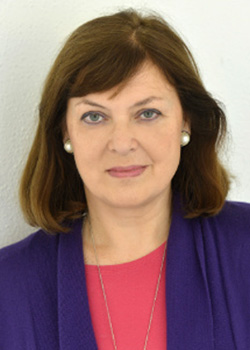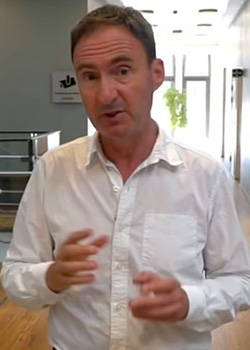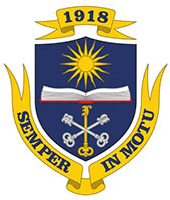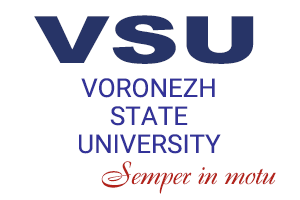Associations
VSU Alumni Association
Voronezh State University is proud of its graduates, many of whom are talented scientists, politicians, heads of companies and organizations, and business people.
Today, each of them has their own life, with new achievements, concerns and joys. However, all of us are still united, since we can proudly call ourselves Voronezh State University graduates. Everyone has warm and loving memories of their time at VSU.
The university alumni form a brotherhood of people from their common alma mater that opened the doors into professional life for them.
We try to keep in touch with all the VSU alumni, making them aware of the upcoming events, inviting them to take part in programmes and events organized by the Alumni Association and the University as a whole. They take part in conferences, seminars, symposiums, round-table meetings, master classes, conventions, discussions, counselling sessions, and other theme-based events involving the leading scholars and authorities both on a permanent and temporary basis.
We assist the alumni in meeting each other and their lecturers. In order to do so, we are creating an alumni database.
If you graduated from the VSU and you wish to do something useful for yourself and your university – you are welcome to register at our website and fill in a form there.
Key VSU Alumni
Several British Alumni of VSU: have become highly successful in their respective careers in British society:
Notably,
 Bridget Kendall, MBE is an English journalist who was the BBC's Diplomatic correspondent working for the corporation's radio and television networks. Since July 2016, she has been Master of Peterhouse, Cambridge: she is the first woman to head Peterhouse college at the University of Cambridge.
Bridget Kendall, MBE is an English journalist who was the BBC's Diplomatic correspondent working for the corporation's radio and television networks. Since July 2016, she has been Master of Peterhouse, Cambridge: she is the first woman to head Peterhouse college at the University of Cambridge.
 Alan Bookbinder is a British journalist, charity executive, and academic administrator. Since October 2018, he has served as Master of Downing College, Cambridge.
Alan Bookbinder is a British journalist, charity executive, and academic administrator. Since October 2018, he has served as Master of Downing College, Cambridge.
 Catriona Helen Moncrieff Kelly, FBA is a British academic specialising in Russian culture. She is Professor of Russian at the University of Oxford and a Fellow of New College. Catriona Kelly was brought up in London. Her parents were pianist Alexander Kelly and cellist Margaret Moncrieff.
Catriona Helen Moncrieff Kelly, FBA is a British academic specialising in Russian culture. She is Professor of Russian at the University of Oxford and a Fellow of New College. Catriona Kelly was brought up in London. Her parents were pianist Alexander Kelly and cellist Margaret Moncrieff.
 Michael Bird, OBE, is the former Director of the British Council in Russia and currently has the post of Cultural Counsellor at the British Embassy in Moscow. The year Michael spent studying in Russia influenced his future life greatly: his wife was also a VSU alumna! Michael studied at three universities; Cambridge, Harvard and Voronezh. He worked in the British Council for 31 years creating and improving cultural relations> He organized the Year of Language and Literature in Great Britain and Russia, the Year of Science and Education and is planning the Year of Music.
Michael Bird, OBE, is the former Director of the British Council in Russia and currently has the post of Cultural Counsellor at the British Embassy in Moscow. The year Michael spent studying in Russia influenced his future life greatly: his wife was also a VSU alumna! Michael studied at three universities; Cambridge, Harvard and Voronezh. He worked in the British Council for 31 years creating and improving cultural relations> He organized the Year of Language and Literature in Great Britain and Russia, the Year of Science and Education and is planning the Year of Music.
 Tim Whewell started his career in international journalism, working for the Sheffield Morning Telegraph after reading for a degree in Russian at Oxford University and he then attended the Cardiff School of Journalism. He began his BBC career as a "talks writer" at Bush House, specialising in Russian affairs and has become highly influential. He has a strong interest in the changing face of British society and inter-ethnic relations – and worked on a series of reports for the BBC that first highlighted the extent and impact of east European migration to the UK. A former BBC Moscow correspondent, he specialises in foreign affairs – particularly the former Soviet Union, Eastern Europe and Africa.
Tim Whewell started his career in international journalism, working for the Sheffield Morning Telegraph after reading for a degree in Russian at Oxford University and he then attended the Cardiff School of Journalism. He began his BBC career as a "talks writer" at Bush House, specialising in Russian affairs and has become highly influential. He has a strong interest in the changing face of British society and inter-ethnic relations – and worked on a series of reports for the BBC that first highlighted the extent and impact of east European migration to the UK. A former BBC Moscow correspondent, he specialises in foreign affairs – particularly the former Soviet Union, Eastern Europe and Africa.
 Stephen Hagen – Emeritus Professor, former UK Vice-Chancellor (University of Wales, Newport). He was awarded an Honorary Doctorate by VSU in June 2019, where he is a member of the University Board. He studied at Durham University, was formerly Professor at Warwick University & Fellow of Warwick Business School, specializing in educational entrepreneurship. Stephen was awarded an Honorary Professorship by the National Agrarian University of Kazakhstan (2016). Stephen was one of the first Britons to be appointed to the post of Pro-Rector at a Russian University (ITMO University, 2014) where he led on the management of change.
Stephen Hagen – Emeritus Professor, former UK Vice-Chancellor (University of Wales, Newport). He was awarded an Honorary Doctorate by VSU in June 2019, where he is a member of the University Board. He studied at Durham University, was formerly Professor at Warwick University & Fellow of Warwick Business School, specializing in educational entrepreneurship. Stephen was awarded an Honorary Professorship by the National Agrarian University of Kazakhstan (2016). Stephen was one of the first Britons to be appointed to the post of Pro-Rector at a Russian University (ITMO University, 2014) where he led on the management of change.
VSU-UK Relations
UK Universities have had a strong, lasting relationship with VSU which has endured nearly half a century (47 years) – one of the most consistent and stable of academic relationships in the world.
Early History (1972–75)
Voronezh State University was selected by the British Council as a centre for its Study Abroad students in 1970 and the first undergraduates arrived in 1972.
Voronezh was chosen as a destination for UK students precisely because it was a large provincial city with amenities and it provided an alternative experience to the more traditional centres of Moscow and St Petersburg (or ‘Leningrad’ as it was then).
VSU was selected as a classical high quality university because of its breadth of subjects, allowing for many diverse dissertation topics and opportunities for UK students to develop new interests and meet Russian students from a variety of subject-areas.
However, the deciding factor why the British Council and many UK universities chose to send their students to VSU was the quality and size of its Languages Department, with a special emphasis on teaching Russian as a Foreign Language and its capability in teaching contemporary and 19th Century Russian literature and Russian Area Studies.
The vast majority of British students were undergraduates who came after two years of studying Russian as a major subject at BA Level. Depending on their academic commitments in their home UK = university, the period of study abroad ranged from 3–12 months. The majority came for a semester and were classified as ‘exchange students’.
The preference for a semester abroad (and not an academic year) was because many of these students were studying two languages (Joint Honours) and were obliged to spend their third year studying abroad in two foreign countries i.e. in Russia for half a year and the other country of study for the other half-year. Students studying Russian as a Single Honours subject tended to come for a full academic year (9 months). UK students did not take VSU qualifications; they were all ‘Study Abroad’ students. Some were British Council scholars in receipt of a UK government grant and relatively wealthy.
At first, only a few British universities sent undergraduates to study at VSU: namely, Cambridge, Durham, Essex, Sheffield and Wolverhampton. But this grew rapidly in the following years.
Development of VSU as a Study Centre for UK Students
During the 70s, 80s and 90s, the numbers of UK students choosing to come to VSU grew rapidly up to 50 per annum. What is astonishing – and a testimony to VSU’s popularity – is the range of universities which sent their students to VSU.
The list of sponsoring UK universities is long, over 30, and includes universities from every part of the United Kingdom: from England (north, south, east and west), Scotland, Northern Ireland and Wales. Furthermore, students came from prestigious universities in the global top 100, such as Cambridge, Oxford, Bristol, London, Edinburgh, as well as less well-known UK universities like Hull, Ulster and Portsmouth.
It is a testament to VSU’s academic prowess and teaching methods that it has been able to manage students of Russian at all levels; some who had started learning Russian at university as well as students with A-levels in Russian who came to university already with advanced Russian.
In 1975 the first UK postgraduates started coming to VSU to undertake research, the first was Stephen Hagen from Durham University who was researching modern Russian short story writers, notably Bitov and Aksenov.
By 2018, over 1000 UK students had studied at VSU for three months or more and taken a powerful memory of VSU away with them.
Recent History: The British Alumni Group and VSU’s Centenary Celebration
Unfortunately, the numbers of students studying Russian in UK universities started to decline from the mid-nineties due to lessening interest in studying languages at secondary school. Policy changes in UK education led to a further decline when languages were dropped from the obligatory school curriculum for post-14 year-old students and universities were forced to merge their Russian departments. Russian became optional for UK students and universities now depended on convincing students to start Russian from scratch. This has meant that the demand for studying Russian at VSU has dropped in the 2000s to approximately 10 per annum and sometimes even to single figures.
However, the interest in VSU amongst its UK alumni has never diminished and has actually become even more enthusiastic with the formation of the VSU British Alumni Steering Committee comprising Stephen Hagen, Derek Averre and Julia South in 2017, which was set up to convene VSU’s British Alumni and celebrate the centenary of VSU in 2018.
It was surprisingly difficult to find and contact VSU’s UK Alumni who had not only studied at universities spread all over the UK, but many of the female Alumni had also changed their names. Rarely do UK students study at their local university and it is even rarer for UK graduates to stay and work in their place of university study. So there was no easy way of finding the alumni – especially because – in some cases – it was decades after they had left both VSU and their own UK university.
The British Alumni Group numbered over 20 at the VSU Centenary ceremony, some of whom had travelled to Voronezh for the first time in 40 years!
See Facebook page ‘Voronezh State University British Alumni’.
This first meeting in Voronezh was followed by a further reunion at Downing College Cambridge in July 2019, which was hosted by Alan Bookbinder, now Master of Downing College Cambridge, and an alum of VSU.
Voronezh State University • 1997–2024

